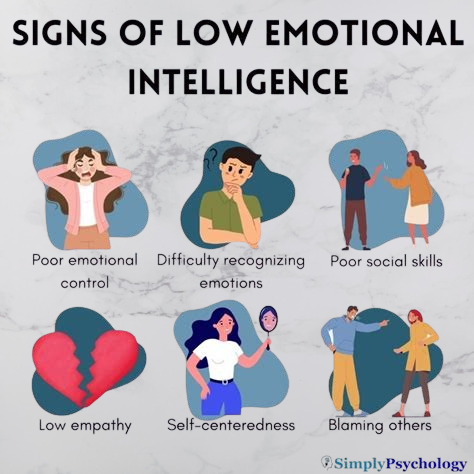Understanding Emotional Intelligence

Emotional intelligence (EI) refers to the ability to recognize, understand, and manage our own emotions while also being attuned to the emotions of others. This multifaceted construct encompasses five key components: self-awareness, self-regulation, motivation, empathy, and social skills. Each of these elements plays a vital role in how individuals interact with themselves and their environment, thus significantly influencing mental health.
Self-awareness, the first component, entails recognizing one’s emotions and how they affect thoughts and behaviors. Individuals with high self-awareness can accurately assess their feelings, which results in better decision-making and emotional expressions. Following closely, self-regulation involves managing one’s emotional responses in a healthy manner. This capability allows individuals to control impulses and adapt to changing circumstances, leading to a more stable emotional state.
Motivation, another essential aspect, drives individuals to pursue goals with energy and persistence. This intrinsic motivation is connected to an individual’s emotional well-being, as it encourages positive engagement and resilience in the face of challenges. Empathy, the fourth component, involves understanding and sharing the feelings of others, fostering deeper interpersonal relationships and increased social support. This is crucial, as strong social connections are linked to improved mental health outcomes.
Finally, social skills encompass the ability to communicate effectively, resolve conflicts, and build strong relationships. Individuals with well-developed social skills are better equipped to interact with others, fostering environments that are conducive to positive emotional experiences. Overall, understanding emotional intelligence and its components illuminates its profound relevance to mental health. By cultivating these skills, individuals can enhance their emotional well-being and lead healthier, more fulfilling lives.
The Link Between Emotional Intelligence and Mental Health
Emotional intelligence (EI) refers to the ability to recognize, understand, and manage one’s emotions while also being able to empathize with others’ emotions. Recent research indicates a significant correlation between emotional intelligence and mental health outcomes. Individuals who possess higher emotional intelligence often demonstrate enhanced mental well-being, manifesting as lower levels of anxiety and depression.
Numerous studies have illustrated that individuals with well-developed emotional intelligence skills can effectively navigate their emotional responses, which improves their overall mental health. These individuals find it easier to cope with stress, engage in healthier interpersonal relationships, and exhibit a greater capacity for emotional resilience. According to a study published in the Journal of Positive Psychology, participants with higher EI were more likely to employ constructive coping strategies during times of stress, thereby mitigating the negative impacts on their mental health.
Furthermore, emotional intelligence has been linked to greater life satisfaction and well-being. Individuals with strong emotional intelligence tend to possess an enhanced ability to tackle challenges and adapt to changing circumstances. This adaptability can significantly reduce the risk of developing mental health disorders, particularly anxiety and depression. A meta-analysis conducted by researchers at the University of Illinois found that higher emotional intelligence was consistently associated with lower rates of these disorders across diverse populations.
Interestingly, the relationship between emotional intelligence and mental health is bidirectional; while high emotional intelligence can lead to improved mental health, mental health issues can also impair one’s emotional intelligence. This self-reinforcing cycle emphasizes the importance of cultivating emotional intelligence as a preventive measure against deteriorating mental health. By fostering these skills, individuals can enhance their emotional resilience, leading to a more balanced and fulfilling life.
Developing Emotional Intelligence: Key Strategies
Emotional intelligence plays a vital role in mental health, influencing how individuals perceive and respond to their emotions and the emotions of others. To cultivate emotional intelligence, several practical strategies can be employed. One of the most effective methods is practicing mindfulness. Mindfulness involves being present in the moment and observing one’s thoughts and feelings without judgment. This practice allows individuals to develop a deeper awareness of their emotional responses and enhances their ability to regulate these feelings. Techniques such as meditation, deep-breathing exercises, and mindful journaling can be beneficial in fostering this skill.
Another essential aspect of developing emotional intelligence is enhancing self-reflection skills. Self-reflection involves analyzing one’s own thoughts, emotions, and behavior patterns, facilitating greater personal insight. Individuals can begin by setting aside regular time to reflect on daily interactions and feelings, asking themselves questions about how they reacted in particular situations and why. Keeping a journal can also be instrumental in this process, providing a space to document emotions and track progress over time. Engaging in this introspective practice encourages individuals to identify triggers and patterns, ultimately aiding in emotional management and decision-making.
Effective communication is also crucial for building emotional intelligence. It encompasses not just articulating one’s feelings but also active listening to others. Individuals should strive to practice empathetic listening, which involves paying full attention to the speaker, showing understanding, and validating their emotions. This approach fosters stronger and more meaningful connections with others, enhancing one’s emotional competencies. By improving both self-expression and interpersonal communication skills, individuals can navigate their emotional landscape with greater ease.
Implementing these strategies—mindfulness, self-reflection, and effective communication—can significantly contribute to the development of emotional intelligence. These practices not only improve mental well-being but also create healthier relationships, ultimately leading to a more fulfilling life.
Emotional Intelligence in Relationships and Its Impact on Mental Health

Emotional intelligence (EI) plays a crucial role in fostering healthy relationships, both personal and professional. It encompasses the skills of recognizing, understanding, and managing one’s own emotions while also being attuned to the emotions of others. Such capabilities are imperative for effective communication, enabling individuals to navigate the complexities of interpersonal interactions with greater ease and understanding. When individuals possess high levels of emotional intelligence, they are better equipped to resolve conflicts amicably, fostering an environment where mutual respect and understanding thrive.
In personal relationships, emotional intelligence can enhance empathy, allowing individuals to connect on a deeper level. By acknowledging the emotions of partners, friends, or family members, one can respond more sensitively and supportively. This leads to stronger bonds, as individuals feel heard and validated. For instance, when conflicts arise, those with developed emotional intelligence are likely to approach disagreements with an open mind, aiming for resolutions rather than escalation. This creates a foundation of trust, significantly lowering stress levels and consequently benefiting overall mental health.
In the workplace, EI is equally important. Employees who exhibit emotional intelligence are often better team players, as they can navigate the diverse emotional landscapes of their colleagues. They can facilitate constructive dialogue and foster a positive atmosphere that encourages collaboration and innovation. Additionally, when conflicts occur in professional settings, emotionally intelligent individuals are more adept at finding compromises that satisfy all parties involved, reducing workplace stress. Strong professional relationships can contribute to an increased sense of belonging and job satisfaction, both of which are essential for maintaining good mental health.
In conclusion, emotional intelligence is fundamental in shaping both personal and professional relationships. The ability to understand and manage emotions not only fosters empathy and connection but also significantly enhances mental health outcomes. By cultivating emotional intelligence, individuals can impact their relationships positively, providing a supportive framework for emotional well-being.
Emotional Intelligence and Coping Mechanisms
Emotional intelligence (EI) plays a pivotal role in the way individuals cope with stress. Defined as the ability to perceive, understand, manage, and utilize emotions effectively, higher levels of emotional intelligence equip individuals with the tools needed to navigate through challenging situations. Those with elevated EI tend to exhibit better stress management, as they are adept at recognizing their own emotional states and those of others. This recognition allows for a more nuanced response to stressors, rather than being overwhelmed by them.
One significant aspect of emotional intelligence is emotional regulation, which refers to the ability to control emotional responses in various situations. Individuals with higher emotional intelligence can adapt their reactions based on the context, leading to healthier coping mechanisms. They are more likely to engage in problem-solving approaches rather than resorting to avoidance or denial. For instance, when faced with a stressful work deadline, a person with elevated EI might prioritize tasks and communicate effectively with colleagues to alleviate pressure and uncertainty, thereby enhancing group dynamics.
Furthermore, emotional intelligence fosters resilience. This quality allows individuals to bounce back from setbacks and adapt to changes more seamlessly. When facing adversity, those with high EI are typically able to maintain a positive outlook, drawing on their emotional resources to assess the situation, process their feelings, and strategize their next steps. Their ability to approach challenges with a growth mindset can further mitigate feelings of frustration and anxiety, leading to more constructive coping strategies.
In summary, emotional intelligence significantly enhances one’s ability to cope with stressors in life. By fostering awareness, emotional regulation, and resilience, individuals can develop effective coping mechanisms that not only support mental health but also promote overall well-being.
The Role of Emotional Intelligence in Workplaces

Emotional intelligence (EI) plays a pivotal role in workplace settings, significantly impacting team dynamics and employee well-being. It encompasses the ability to identify, understand, manage, and utilize emotions effectively, both in oneself and in interpersonal interactions. In an environment where collaboration and communication are essential, emotional intelligence fosters an atmosphere of trust and respect, enabling employees to navigate challenges cohesively.
Leaders with high emotional intelligence are better equipped to motivate their teams, as they can recognize the emotional needs of their employees. This understanding empowers leaders to create a supportive environment that promotes open dialogue and encourages employees to express their concerns and ideas without fear of judgment. Such leadership not only enhances team morale but also contributes to overall mental health by reducing stress and anxiety levels among staff, leading to improved productivity and job satisfaction.
Moreover, emotional intelligence cultivates resilience within teams. Employees who possess high EI are better prepared to manage conflict, adapt to change, and respond positively to feedback. When individuals feel understood and valued, their engagement and commitment to the organization rise. This is particularly crucial in high-pressure settings where emotional challenges can significantly affect mental health.
Additionally, organizations that prioritize emotional intelligence within their workplace culture often see reduced turnover rates and improved employee loyalty. Training and development programs aimed at enhancing emotional intelligence skills equip employees with tools to navigate professional relationships effectively, fostering a collaborative spirit that benefits the entire organization. As emotional intelligence increasingly becomes a focal point in human resources, its integration is essential for cultivating a healthy work environment conducive to both individual and team-oriented success.
Recognizing Emotional Intelligence in Children and Adolescents

Emotional intelligence (EI) refers to the ability to recognize, understand, and manage one’s emotions as well as the emotions of others. Cultivating emotional intelligence from an early age in children and adolescents is crucial for their mental development and can significantly influence their future mental health. By fostering this skill set, children can enhance their ability to communicate effectively, develop empathy, and form healthy relationships.
One of the primary benefits of developing emotional intelligence in younger individuals is improved emotional regulation. When children learn to identify and articulate their feelings, they gain better control over their responses, which is essential in navigating the complexities of social interactions. Additionally, children with higher emotional intelligence are often more resilient, enabling them to cope with stress and adversity more effectively. This resilience becomes increasingly important during adolescence, a period marked by emotional upheaval and identity exploration.
Furthermore, instilling emotional intelligence nurtures a sense of empathy among peers. Children who understand their emotions are typically more attuned to the feelings of others, which fosters supportive relationships and reduces instances of bullying. High emotional intelligence in social settings also promotes collaboration and teamwork, which are critical skills in both academic and future professional environments.
Parents, educators, and caregivers play a pivotal role in recognizing and nurturing emotional intelligence in children and adolescents. By providing opportunities for emotional expression and modeling empathy, adults can create an environment conducive to emotional growth. Techniques such as role-playing, storytelling, and open discussions about feelings can effectively enhance the emotional intelligence of children. Overall, the significance of fostering emotional intelligence in the formative years cannot be overstated, as it lays the groundwork for healthier mental health outcomes in adulthood, making it a vital aspect of development.
Challenges to Developing Emotional Intelligence
Enhancing emotional intelligence is a vital aspect of fostering mental health, yet various challenges can impede this development. One significant barrier arises from cultural beliefs. Societies often have distinct ways of expressing and interpreting emotions, influenced by traditions and values. In some cultures, emotions may be viewed as a sign of weakness, discouraging individuals from exploring or articulating their feelings. This cultural stigma can lead to an internal conflict where individuals desire to understand their emotional states but feel constrained by societal expectations.
Another obstacle to the development of emotional intelligence is the lack of education on the subject. In many educational systems, there is a minimal emphasis on emotional learning or social skills. Without a solid foundation in recognizing and managing emotions, individuals may struggle to garner the skills necessary for increasing their emotional intelligence. This absence can perpetuate cycles of misunderstanding and poor emotional regulation, negatively impacting mental health.
Moreover, personal experiences play a significant role in shaping one’s emotional awareness. Individuals who have faced trauma or have been raised in environments lacking emotional guidance may find it particularly challenging to identify and express their feelings. These experiences can lead to a skewed perception of emotional interactions, reinforcing difficulties in building empathy and understanding. Over time, these barriers can create a considerable gap in an individual’s emotional intelligence, limiting their ability to manage stress, communicate effectively, and maintain healthy relationships.
Recognizing these challenges is critical as it enables individuals to develop strategies to overcome these barriers. By understanding the cultural, educational, and experiential factors that influence emotional intelligence, individuals can take proactive steps toward improving their emotional health, facilitating better mental well-being in the long run.
The Future of Emotional Intelligence in Mental Health Research

The future of emotional intelligence research in the domain of mental health is poised to yield significant insights that could revolutionize therapeutic practices and interventions. As mental health awareness continues to grow, researchers are increasingly recognizing the essential role emotional intelligence plays in understanding and managing both personal emotions and interpersonal relationships. Emerging studies are beginning to reveal how cultivating emotional intelligence can lead to improved mental health outcomes, further substantiating its importance in clinical settings.
Recent trends point to an interdisciplinary approach to studying emotional intelligence, integrating findings from psychology, neuroscience, and social sciences. For instance, cutting-edge neuroimaging techniques are revealing the neural correlates of emotional intelligence, indicating how it influences cognitive functions and emotional regulation. This evidence paves the way for developing targeted interventions designed to enhance emotional intelligence, which can potentially lead to decreased anxiety, depression, and stress-related disorders.
Additionally, the field of digital health is witnessing a surge in tools aimed at fostering emotional intelligence. Mobile applications and online programs provide individuals with resources to enhance their emotional skills. Innovations like virtual reality experiences and interactive platforms offer immersive opportunities to practice and develop emotional intelligence in various contexts. Such applications could democratize access to emotional intelligence training, allowing a broader population to benefit from these crucial skills.
Moreover, upcoming research is anticipated to explore the link between emotional intelligence and diverse populations, including children, adolescents, and marginalized communities. By understanding these relationships, mental health professionals can create interventions that are culturally and contextually relevant. As the importance of emotional intelligence in mental health continues to be established, future research will undoubtedly illuminate pathways for enhanced emotional resilience, ultimately contributing to the betterment of mental health practices.




[…] Stress levels refer to the degree of pressure or tension an individual experiences in response to different stimuli. It is a complex interplay of physiological and psychological factors that contribute to how one perceives and reacts to various challenges. Physiologically, stress triggers the body’s fight-or-flight response, leading to the release of hormones such as cortisol and adrenaline. These hormones prepare the body for immediate action but, when consistently elevated due to ongoing stressors, can lead to detrimental health outcomes including cardiovascular issues and immune system suppression. […]
[…] Moreover, an organized environment can influence one’s ability to engage in positive habits. For instance, a tidy kitchen encourages healthier cooking and eating practices, while an uncluttered workspace can increase productivity. Cleanliness and organization contribute significantly to mental clarity. When individuals take the time to create a space that is aesthetically pleasing and functional, they are better equipped to handle daily stressors. Therefore, to cultivate a stress-reducing environment, it is crucial to assess and organize one’s surroundings strategically. By transforming cluttered spaces into serene retreats, individuals can take a significant step towards enhancing their overall well-being. […]
[…] negative thought patterns often arise from a combination of personal experiences, environmental factors, and underlying beliefs. They can significantly affect mental health, […]